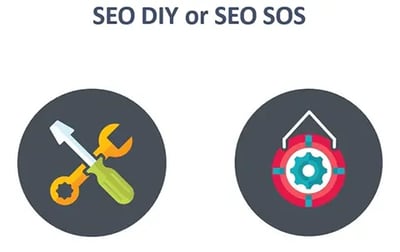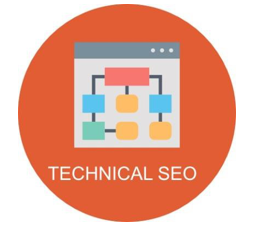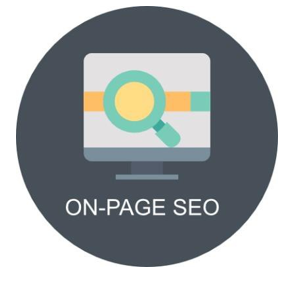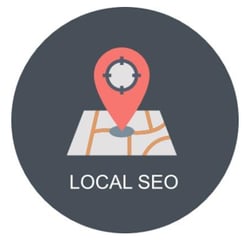SEO Audit: Maximizing Results with a Comprehensive Website Audit
- Home
- SEO Audit: Maximizing Results with a Comprehensive Website Audit
What is SEO Audit?
The term SEO audit refers to a comprehensive analysis of a website that examines its current performance in search engine optimisation. This process helps website owners identify areas for improvement and areas that are working well so that they can make changes to improve their website's ranking on search engines.

An SEO audit can provide a website owner with valuable information about their website's strengths and weaknesses. It can help identify technical issues, content optimisation problems, and other areas for improvement. However, an SEO audit cannot guarantee top rankings on search engines. Rankings depend on many factors, including competition and changes in search engine algorithms.
Things an SEO audit can’t do:
- Predict a rise in site traffic
- Predict an increase in qualified leads
- Fix Google rankings
- Be rushed
- A one-size-fits-all
- Do the work for you (I know, this one upsets us too)
Things an SEO audit can reveal:
- Technical SEO issues
- Website structure issues
- On-page SEO issues
- Potential off-site problems
- User experience issues
- Content gaps and opportunities
- Competitive marketplace insights
SEO DIY or SEO SOS
Website owners can conduct their SEO audit using various tools and resources available online. This is often referred to as a "DIY" (Do It Yourself) audit. Alternatively, they can seek professional help from an SEO agency or consultant. This is often referred to as an "SOS" (Save Our Site) audit
 Regardless if it is SEO DIY or SEO SOS, take note that the SEO Audit is divided into categories such as:
Regardless if it is SEO DIY or SEO SOS, take note that the SEO Audit is divided into categories such as:
- Technical SEO
- On-page SEO
- Off-page SEO
- Local SEO
- Mobile SEO
- eCommerce SEO
How and where do you get the information needed?
Information needed for an SEO audit can be obtained through various sources, including website analytics tools, Google Search Console, keyword research tools, and website code. Examples of data sources include:
How is my SEO audit information displayed?
BigQuery allows you to process data, plus apply Structured Query Language (SQL) logic. This is where it gets really exciting. Put together it allows for fabulous automation to produce usable information such as:
- Accumulation of SEO data (from all 6 sources) at the URL level. Organised, and formatted, this data is ready to view and for you to rock and roll. Every page of your site has been analysed for you to make an informed SEO decision.
- Generates a category for each page. Pages are read and determined by category e.g. blog post, product page landing page etc. This allows you to highlight and analyse specific sections of your website and optimise your data by comparing like-for-like performance.
- Automatically assigns recommended action to each page. I know, read that heading again. Can you imagine, we used to have to do this manually with every URL? Now, BigQuery absorbs the information, churns it up and spits it out with specific actions and directions to improve Site SEO on every page. This is mind-blowing, not only because it’s genius but because it provides the perfect blueprint for any SEO campaign. You know exactly where and how you’re going to optimise your ENTIRE site.
These actions are broken down into 4 categories for analysis:
- Technical
- On-page (content)
- Off-page
- Architectural
Within your report, you can view what actions have been taken and the remaining opportunities to render.
Scheduled reporting and refreshes
An SEO audit should be performed regularly, at least once a year, to keep up with changes in search engine algorithms and to identify new areas for improvement. Scheduling regular reports and refreshes can help website owners keep track of their SEO performance and make necessary changes to improve their website's ranking.
What is SEO?
SEO is the process of optimising a website to rank higher in search engine results pages (SERPs) and attract more organic traffic. This process involves changing the website's design, content, and structure to make it more appealing to search engines and users. The goal of SEO is to increase a website's visibility, drive more traffic to the site, and ultimately generate more business or conversions.
Ref: You can learn about the history of SEO here.
SEO is one of the most important components of online marketing and is a powerful phrase in the world of digital marketing. With more and more people using search engines to find products, services, and information online, businesses must have a strong online presence and rank well in search results.
The basics of SEO
SEO is the process of optimizing a website to rank higher in search engine results pages (SERPs) and attract more organic traffic. The basics of SEO include:
- Keyword research: Understanding which keywords your target audience is searching for and incorporating those keywords into your website's content.
- On-page optimization: This involves optimizing elements such as title tags, meta descriptions, and content to make sure that your website is easily accessible and understandable for both search engines and users.
- Off-page optimization: This involves building high-quality backlinks from other reputable websites, which shows search engines that your website is a credible source of information.
SEO best practices (the do’s and don’ts)
Technically, there are three types of SEO practices:
- White Hat SEO- uses ethical tactics and follows search engine guidelines
- Grey Hat SEO- uses undetermined tactics that neither fall under a white nor black hat.
- Black Hat SEO – uses risky practices against search engine guidelines.
Search Engine Optimisation (SEO) best practices are key to improving a website's ranking in search results and attracting organic traffic. To optimize your website for both search engines and users, it is important to:
- Create high-quality, relevant content.
- Use relevant keywords throughout your content, but avoid keyword stuffing.
- Build high-quality, relevant backlinks from other websites.
- Avoid using irrelevant backlinks or duplicate content.
By following these best practices, you can improve your website's ranking in search results, increase visibility, and attract more organic traffic. By avoiding common mistakes, you can ensure that your website is optimized for success.
Why do we need SEO?
One of the primary reasons why we need SEO is to reach a wider audience. With millions of people using search engines every day, SEO provides a way to connect with potential customers who are actively searching for products or services that your business offers.
By optimizing your website to rank higher in SERPs, you increase your chances of being seen by your target audience and driving more traffic to your website.
Another reason why SEO is important is that it helps build trust and credibility with both search engines and users. Search engines use complex algorithms to determine the relevance and quality of a website's content, and a well-optimized website with high-quality content will rank higher in SERPs. This high ranking signals to users that the website is trustworthy and credible, and it increases the chances that they will interact with your brand and make a purchase.
SEO is also crucial for staying ahead of the competition. With so many businesses vying for attention in the online marketplace, having a strong SEO strategy is essential for differentiating your brand and standing out from the crowd. By investing in SEO, you can gain a competitive advantage and increase your chances of attracting and retaining customers.
Finally, SEO is important because it provides a long-term, sustainable way to drive traffic and grow your business. Unlike paid advertising, which provides immediate results but stops as soon as you stop paying, the results of SEO are ongoing and long-lasting. By continually optimizing your website and producing high-quality content, you can maintain your rankings in SERPs and continue to drive traffic and conversions over time.
Tools for SEO
SEO is a complex and ever-evolving field, and it can be challenging for website owners to stay on top of all the latest best practices and changes to search engine algorithms. To help with this, there are many tools available that can aid in the optimization process. These tools can be broadly grouped into three categories: keyword research tools, website analytics tools, and backlink analysis tools.
- Keyword research tools help website owners identify the keywords and phrases that their target audience is searching for. This information can be used to optimize website content, meta tags, and other on-page elements to ensure that the website is ranking well for those keywords. Some popular keyword research tools include Google Keyword Planner, SEMrush, and Ahrefs Keywords Explorer.
- Website analytics tools provide website owners with a wealth of information about their website's performance, including the number of visitors, bounce rate, and average time on site. This information can help website owners understand how their website is performing and identify areas for improvement. Some popular website analytics tools include Google Analytics, Adobe Analytics, and Piwik.
- Backlink analysis tools allow website owners to see who is linking to their website and the quality of those links. Backlinks are one of the most important ranking factors for search engines, and having a strong backlink profile can help a website rank higher in search results. Some popular backlink analysis tools include Ahrefs, Majestic, and Moz Link Explorer.
- AI Tools. There are now many ways that you can use AI to help with SEO. Some examples.
SEO tools can be classified into two:
Paid SEO tools
- Majestic SEO
- SEMrush
- Ahrefs
- Deep Crawl
- Moz Pro
Free SEO tools
- Google Analytics
- Google Search Console
- Google Page Speed Insights
- Bing Webmaster
- XML Sitemap
- Screaming Frog SEO Spider
The Importance of SEO
Search Engine Optimisation (SEO) is a critical part of digital marketing that involves improving the visibility of a website in search engine results pages (SERPs) by optimizing various elements to make the website more appealing to search engines and users.
The importance of SEO in today's digital age cannot be overstated. With the increasing number of people relying on search engines to find the products and services they need, having a strong online presence has become essential for businesses to reach their target audience and achieve their goals.
SEO involves optimising various aspects of a website, such as its content, meta tags, and backlinks, to ensure that it is relevant, high-quality, and easily accessible to both search engines and users. This can help businesses rank higher in search results pages, attract more organic traffic, and generate more leads and conversions.
Additionally, SEO can also help businesses establish their brand, build trust and credibility, and improve the user experience.
In conclusion, SEO is a crucial component of digital marketing that can help businesses succeed in today's competitive online environment. By investing in SEO, businesses can increase their visibility, reach their target audience, and achieve their goals. Businesses need to take SEO seriously and understand its importance to reap its many benefits and remain competitive in the digital age.
Important parts of SEO
SEO involves several important components that can impact a website's ranking in search results. These components include:
- Keyword research and optimisation
- On-page optimisation (title tags, meta descriptions, content, etc.)
- Off-page optimisation (backlinks)
- Website structure and navigation
- Mobile optimisation
- Local SEO
- User experience
All of these components play a crucial role in optimising a website for search engines and should be considered as part of a comprehensive SEO strategy.
The most essential elements of an SEO include:
- Site structure and navigation
- Crawling and indexing
- Industry and audience
- User intent
- Keyword research
- Links
- Analytics and Reporting
Algorithms and ranking factors
Search engine algorithms are designed to provide users with the most relevant and useful search results and to do this, they consider a variety of ranking factors.
These factors are designed to help search engines determine the relevance and quality of a website and to ensure that users receive the most relevant and useful results for their search queries.
The most important Google ranking factors of 2021 include:
- Referring domains
- Organic click-through rate
- Domain authority
- Mobile usability
- Dwell time
- Total number of backlinks
- Content quality
- On-page SEO
Ryan Dean of Backlinko shares a compilation of Google ranking factors, examples, tips and tricks.
Main Types of SEO
The process of SEO involves several components, and understanding the main types of SEO is essential for a comprehensive SEO strategy.
Technical SEO - refers to the optimisation of a website's technical aspects, such as its structure, coding, and security. Technical SEO is crucial for ensuring that search engines can crawl and index a website accurately, and it can impact a website's ranking in search results. Technical SEO components include website speed, mobile optimisation, website architecture, and the use of structured data.
The purpose of technical SEO is to make sure your site is: 
- Visible
- Accessible
- Crawled
- Interpreted
- Indexed
On-page SEO - refers to the optimisation of individual pages on a website, including the content, images, and meta tags. On-page optimisation involves using keywords, creating high-quality content, and optimising the website's structure to make it more appealing to both users and search engines. On-page optimisation is crucial for improving a website's ranking in search results and driving more organic traffic.
 On-page SEO actions include examining and optimising:
On-page SEO actions include examining and optimising:
- URL title tags
- Headings (H1-H3)
- Meta descriptions
- Alt tags for non-text content
- Anchor text / ID attribution
- List for Google featured snippets
- Internal and external links
- Formatted for Authority, Relevance and Trust (ART) or Expertise, Authoritativeness, Trustworthiness (EAT)
Off-page SEO - refers to the optimisation of a website's external factors, such as backlinks, social media presence, and brand reputation. Off-page optimisation is crucial for building the website's authority and credibility, and it can impact a website's ranking in search results. Off-page optimisation components include link building, social media marketing, and reputation management.
 Off-page SEO actions to consider include:
Off-page SEO actions to consider include:
- Link building
- Link building concepts
- Authoritative incoming links
- Identify and remove bad links
Local SEO - is the process of optimising a website to rank well in local search results. Local SEO is crucial for businesses that serve a specific geographic area, and it involves optimising the website's content and structure to reflect the business's location and services. Local SEO components include local directory listings, local keywords, and Google My Business optimisation.
 Actions to get ahead for local SEO:
Actions to get ahead for local SEO:
- Register for GMB
- Optimise your logo
- ALL pages need NAP information (name, address and phone number)
- Add a Google map
- Encourage and reply to reviews
- Use Schema markup to give more information
 E-commerce SEO - is the process of optimising an online store to rank higher in search results and drive more organic traffic. E-commerce SEO is crucial for online businesses and involves optimising the website's structure, product pages, and content to make it more appealing to both users and search engines. E-commerce SEO components include product optimisation, category optimisation, and checkout optimisation.
E-commerce SEO - is the process of optimising an online store to rank higher in search results and drive more organic traffic. E-commerce SEO is crucial for online businesses and involves optimising the website's structure, product pages, and content to make it more appealing to both users and search engines. E-commerce SEO components include product optimisation, category optimisation, and checkout optimisation.
Mobile SEO - is the process of optimising a website for mobile devices, including smartphones and tablets. Mobile optimisation is crucial for ensuring that users can access and navigate the website easily on their mobile devices, and it can impact a website's ranking in search results. Mobile optimisation components include mobile-friendly design, responsive design, and mobile-friendly content.
 Mobile SEO actions include:
Mobile SEO actions include:
- Mobile-friendly test
- Page load speed
- Mobile website design
- Popup usage (HINT Google doesn’t like that)
CONCLUSION: SEO Audit
A comprehensive SEO audit is a crucial step in optimising a website's ranking in search engine results pages (SERPs) and driving more organic traffic. However, simply conducting an SEO audit is not enough; it's important to take action on the findings of the audit to achieve real results.
In this discussion, we'll discuss the importance of taking action on your SEO audit findings and explore some key strategies for doing so.
If you plant a seed and leave it, it will never grow into a tree. The same is true for an SEO audit. Simply conducting an audit will not yield results unless you take action on its findings. The key is to turn your audit into a roadmap for improvement and prioritize the actions that will have the greatest impact on your website's ranking and traffic.
Target specific areas of your SEO audit report. Your SEO audit report will likely identify a variety of areas for improvement. It's important to prioritize these areas and focus your efforts on the areas that will have the greatest impact. For example, if your audit identifies technical issues with your website's structure or coding, these should be addressed as a priority because they can impact your website's ranking and ability to attract organic traffic.
Assign accountability and actions. It's important to assign specific actions to specific individuals or teams and to hold them accountable for their completion. This will help ensure that your audit findings are acted upon and will help keep your SEO efforts on track.
Ensure conversion and achieve success. Ultimately, the goal of an SEO audit is to drive more organic traffic to your website and to convert that traffic into conversions or business. It's important to measure your progress and adjust your actions as needed to ensure that you're achieving the desired results. This may involve tracking your website's ranking, traffic, and conversions and making adjustments to your SEO strategy as needed to improve these metrics.
In conclusion, taking action on your SEO audit findings is a crucial step in optimising your website's ranking and driving more organic traffic. By targeting specific areas of improvement, assigning accountability and actions, and measuring your progress, you can ensure that your SEO efforts yield real results and help you achieve success.




